Galaxy Tab S6 vs iPad Pro: Which Tablet Should You Buy?
Samsung just took the wraps off the Galaxy Tab S6, an Android competitor to the iPad Pro. Combining a clever design, useful keyboard (with touchpad) and software that gives users a PC-like experience, the 10.5-inch Tab S6 wants to dethrone Apple's flagship slate, which has long been a favorite among business users and creatives.
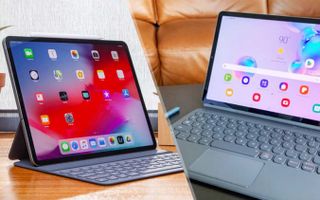
We went hands-on with the Galaxy Tab S6 before it's official release in September and were impressed by what it has to offer. But is it enough to overtake the iPad Pro, which has proven to be one of the best tablets you can buy over the years?
Here's a preliminary look at how Samsung's new Galaxy Tab S6 compared to the iPad Pro.
Design
The iPad Pro and Galaxy Tab S6 are models for what a modern tablet should look like.
These two tablets look quite similar from the front. The Galaxy Tab S6 has a 10.5-inch display while the iPad Pro is available in either 11-inch or 12.9-inch versions. The panels on both tablets are surrounded by narrow bezels that don't allow for a physical button.
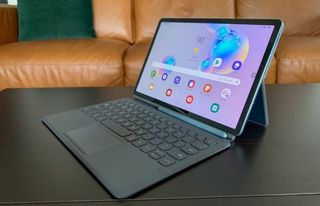
Both tablets have about the same footprint, although the 11-inch iPad Pro (9.7 x 7.0 x 0.2 inches) is a bit larger than the 10.5-inch Galaxy Tab S6 (9.6 x 6.3 x 0.2 inches). And if you're worried about weight, the iPad Pro and Galaxy Tab are only around 1 pound.
Stay in the know with Laptop Mag
Get our in-depth reviews, helpful tips, great deals, and the biggest news stories delivered to your inbox.
The big differences between these two devices are their back panels and how they treat their respective sytli. On the back of the Tab S6 is an indentation where the S Pen stylus magnetically attaches and charges. It's a riff on the iPad Pro's method, where the Apple Pencil docks and charges using a built-in magnet on the top edge.
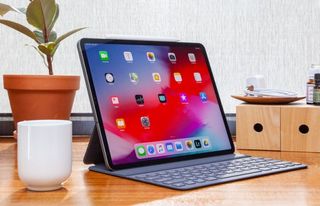
The iPad Pro and Galaxy Tab S6 have clean, elegant exteriors but the Samsung tablet comes in three unique colors: Mountain Gray, Cloud Blue and Rose Blush whereas the iPad is sold in Apple's default Silver and Space Gray.
Both tablets charge via a USB-C port and neither have a headphone jack.
Pricing
The Galaxy Tab S6 is much more affordable than the iPad Pro. Samsung's tablet will start at $649 for a base model (Wi-Fi only) with 6GB of RAM and a 128GB SSD when it ships on Sept. 6. You can upgrade RAM to 8GB and storage to 256GB for an extra $80.
The iPad Pro starts at a hefty $799 for an 11-inch Wi-Fi model with 64GB of storage and the stock 4GB of RAM. Increasing storage to 256GB costs another $150 and you'll spend another $200 to jump up to 512GB. There is also a 1TB config for $1,549. If you want the larger 12.9-inch display, you'll need to spend a minimum of $999.
Display
We'll need to do more testing before we can declare a winner for this category, but it's going to be hard to top the Galaxy Tab S6's 10.5-inch, 2560 x 1600-pixel Super AMOLED screen, which looked bright and vibrant during our hands-on. We'd have no complaints if the Tab S6 had the same display as the class-leading panel on last year's Galaxy Tab S4.
New to the Galaxy Tab S6 is an in-screen fingerprint reader that, while convenient, uses an optical sensor instead of the more responsive ultrasonic method.
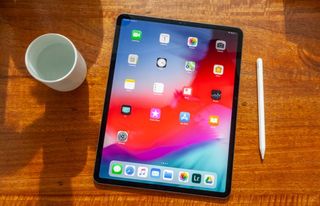
The iPad Pro's display is no slouch, either. With a resolution of 2388 x 1668-pixels, the 11-inch panel should be about as sharp as the display on Samsung's tablet. And if the 12.9-inch model is anything to go by, both sized panels should have vivid colors (though not as captivating as those on the Samsung) and blinding peak brightness.
Operating System
The Samsung Galaxy Tab S6 runs Android 9 Pie with a desktop-like DeX mode for professional users who want cursor support and a windowed UI (think Windows 10). You can now switch between Android and DeX mode by pressing a keyboard shortcut (fn + |).
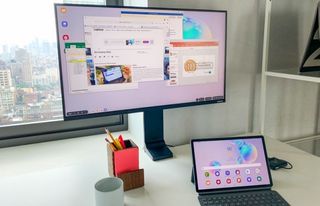
iPads will get a big productivity boost of their own when iPadOS launches later this year. The upcoming operating system will bring some key additions to the mobile OS, including a new home screen, improved multi-tab web surfing and a limited form of mouse support.
Keyboard and Stylus
Arguably the biggest advantage the Galaxy Tab S6 has over the iPad Pro comes via the $179 keyboard and kickstand accessories. The detachable keyboard+kickstand combo has a touchpad, unlike those available for the iPad Pro. For cursor support for the iPad, you need to turn on a limited accessibility feature and use a mouse.
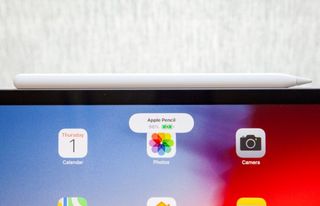
Another reason to buy the Galaxy Tab S6 is that its S Pen comes included with the tablet whereas the Apple Pencil (2nd Gen) is a $129 add-on to the iPad Pro.
Performance
We haven't put either tablet through our benchmarks, but we don't expect the Galaxy Tab S6 to get anywhere near the performance of the iPad Pro.
The A12X Bionic chip inside the 11-inch and 12.9-inch iPad Pros is blisteringly fast. The 7-nanometer SoC (17,995) outperformed a Core i5-powered Surface Pro 6 (13,025) and a Dell XPS 13 with a Core i7 CPU (14,180) on the Geekbench 4 performance test.
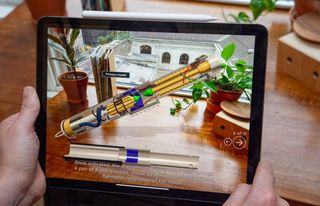
It also destroyed top laptops and 2-in-1s in our video editing test, transcoding a 4K video three times after than the 13-inch MacBook Pro.
We could rave all day about the iPad Pro's outstanding performance, but the point is that the Snapdragon Qualcomm 855 SoC inside the Galaxy Tab S6 would need to perform a miracle to keep up. On the bright side, the 855 should pack a good deal more power than the 835 inside the Tab S4.
Cameras
For the folks who insist on taking pictures with a tablet, the Galaxy Tab S6 has you covered. An Ultra-Wide lens mode offers a 123-degree field of view, which Samsung claims is about that of the human eye.
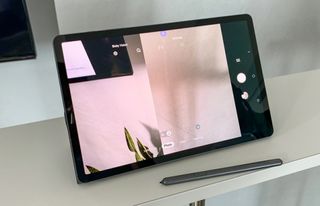
We were impressed with the 12.9-inch iPad Pro's 12-megapixel camera with HDR, which took sharp, colorful images when we snapped some shots around New York City.
Outlook
The Samsung Galaxy Tab S6 is shaping up to be a great alternative to the iPad Pro. Samsung's DeX interface and an optional keyboard with a touchpad could alone be enough to make the Tab S6 a better productivity tablet than the iPad Pro.
Samsung's new slate also has a clever pen dock on the back panel, which could prove to be more convenient than the iPad Pro's solution. And at $649 with the S Pen included, the Tab S6 is significantly less expensive than the iPad Pro.
However, if you want a larger display or the most powerful tablet on the market, then the iPad Pro is still king.
Phillip Tracy is the assistant managing editor at Laptop Mag where he reviews laptops, phones and other gadgets while covering the latest industry news. After graduating with a journalism degree from the University of Texas at Austin, Phillip became a tech reporter at the Daily Dot. There, he wrote reviews for a range of gadgets and covered everything from social media trends to cybersecurity. Prior to that, he wrote for RCR Wireless News covering 5G and IoT. When he's not tinkering with devices, you can find Phillip playing video games, reading, traveling or watching soccer.
